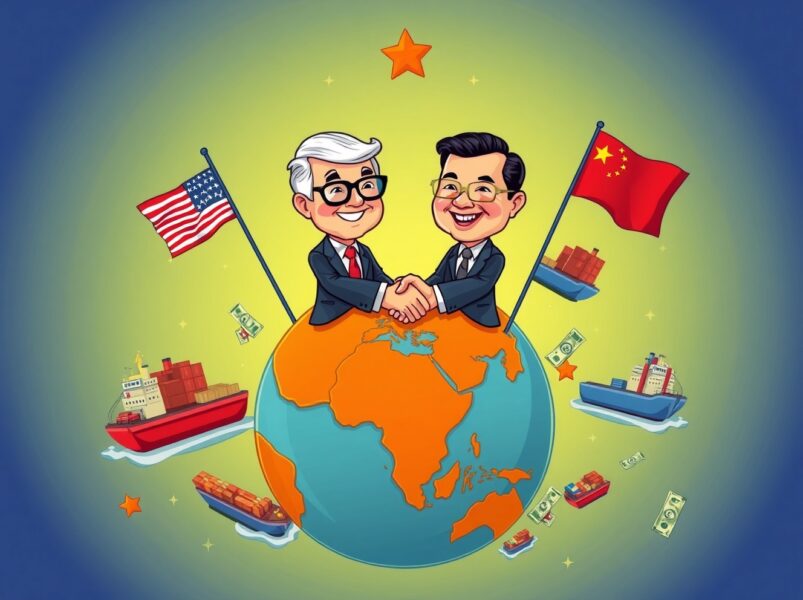US-China Trade Deal: A Crucial Step Towards Global Economic Stability
0
0

BitcoinWorld
US-China Trade Deal: A Crucial Step Towards Global Economic Stability
The global economic landscape is constantly shifting, and few developments hold as much weight as the relationship between the United States and China. Investors and markets worldwide are keenly watching for any signs of progress, and a significant announcement has just emerged. U.S. Treasury Secretary Scott Bessent has confirmed that the much-anticipated US-China trade deal is set to be signed next week, marking a pivotal moment for international commerce and stability.
Why is This US-China Trade Deal So Important?
This upcoming agreement signifies more than just a formal handshake; it represents a concerted effort to de-escalate trade tensions that have impacted global supply chains and market confidence for years. The signing of the US-China trade deal is expected to bring a new level of predictability to international trade, which is crucial for businesses operating across borders.
Consider the broader implications:
- Market Certainty: Businesses and investors thrive on stability. A formal agreement reduces uncertainty, encouraging long-term planning and investment.
- Economic Growth: Reduced tariffs and clearer trade rules can stimulate economic activity, benefiting both nations and their trading partners.
- Global Impact: As the world’s two largest economies, their trade relationship directly influences global growth projections and market sentiment, including in the cryptocurrency space where macro-economic factors play a significant role.
What Challenges Might Linger Even After the Agreement?
While the signing of the US-China trade deal is undoubtedly a positive step, it is also important to acknowledge that complex relationships often involve ongoing discussions. Trade agreements, especially between major powers, are rarely static and may require continuous dialogue and adjustments over time. Enforcement mechanisms and adherence to the terms will be key areas to monitor.
Potential areas that might still require attention include:
- Enforcement: Ensuring both parties uphold their commitments will be vital for the deal’s long-term success.
- Future Issues: Other geopolitical or economic factors could emerge, requiring further negotiation beyond the scope of this initial agreement.
- Technological Competition: Areas like intellectual property rights and technological dominance often remain points of contention that may not be fully resolved in a single trade deal.
How Will the US-China Trade Deal Impact Global Economies and Beyond?
The ripple effects of this US-China trade deal are expected to extend far beyond Washington and Beijing. When the two largest economies find common ground, it sends a powerful signal of cooperation to the rest of the world. This can lead to increased investor confidence globally, potentially spurring economic recovery and growth in various sectors.
For instance, improved trade relations could:
- Stabilize Supply Chains: Many industries rely on components and goods from both the US and China. A stable trade environment helps ensure smoother production and delivery.
- Boost Investor Sentiment: Reduced trade friction often leads to a more optimistic outlook for global markets, encouraging investment across asset classes.
- Influence Commodity Prices: Demand for various commodities can be affected by the trade volume between these two economic giants.
The impending signature of this significant US-China trade deal marks a crucial juncture. It offers a renewed sense of optimism for global markets and underscores the importance of diplomatic engagement in navigating complex economic relationships. While challenges may always exist, this agreement represents a foundational step towards a more stable and predictable international trade environment. All eyes will be on the signing next week, anticipating its full implications.
Frequently Asked Questions (FAQs)
Q1: Who announced the signing of the US-China trade deal?
A1: U.S. Treasury Secretary Scott Bessent officially announced that the United States and China plan to sign a trade agreement next week.
Q2: What is the primary benefit of this US-China trade deal?
A2: The primary benefit is expected to be increased market certainty and stability, reducing trade tensions that have impacted global supply chains and economic growth.
Q3: Will this agreement resolve all trade issues between the US and China?
A3: While a significant positive step, complex relationships like those between the US and China often require ongoing dialogue. This deal is a foundational step, but future discussions on enforcement and other emerging issues may still be needed.
Q4: How might this US-China trade deal affect global markets?
A4: The deal is anticipated to boost investor confidence, stabilize global supply chains, and potentially influence commodity prices, contributing to a more optimistic outlook for the world economy.
Q5: When is the US-China trade deal expected to be signed?
A5: The agreement is expected to be signed next week, as announced by Treasury Secretary Scott Bessent.
If you found this insight into the upcoming US-China trade deal informative, consider sharing it with your network! Stay informed on how global economic shifts can influence various markets.
To learn more about the latest global economic trends, explore our article on key developments shaping international trade relations and their potential impact on future market stability.
This post US-China Trade Deal: A Crucial Step Towards Global Economic Stability first appeared on BitcoinWorld.
0
0
 Manage all your crypto, NFT and DeFi from one place
Manage all your crypto, NFT and DeFi from one placeSecurely connect the portfolio you’re using to start.





